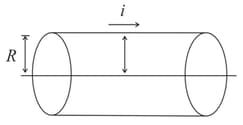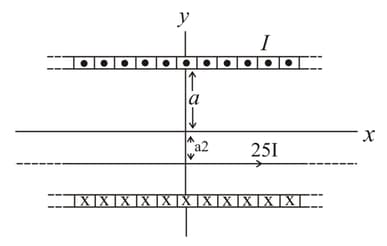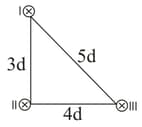Application of Ampere's Law
Application of Ampere's Law: Overview
This topic covers concepts such as Magnetic Field Due to a Current Wire Using Ampere's Law, Magnetic Field Due to a Current Carrying Cylinder Using Ampere's Law, Magnetic Field Due to a Solenoid Using Ampere's Law, etc.
Important Questions on Application of Ampere's Law
A cylindrical conductor of radius carries a current along its length. The current density , however, is not uniform over the cross-section of the conductor but is a function of the radius according to , where is a constant. Then the expression for the magnetic field

at
at
Using Ampere’s circuital law,obtain an expression for the magnetic field along the axis of a current carrying solenoid of length l and having N number of turns.
When the number of turns in a toroidal coil is doubled, then the value of magnetic flux density will become,
Find the magnetic field created by a current carrying wire of current at a distance of from the wire in micro Telsa.
The two ends of non-conducting spring of force constant and unstretched length of are connected to the mid points of two straight parallel rods each of length . When current is passed through each rod in the same direction, the work done on the spring in is
An infinitely long solenoid of radius a and is placed such that its axis of symmetry lies along the -axis. A current is flowing through the solenoid ( means that is flowing into and means it is flowing out of the page). A straight infinite wire with current is placed parallel to the axis at a distance away from the center. Which of the following gives the direction of net magnetic field at the origin?

Using Ampere’s circuital law, obtain the expression for the magnetic field due to a long solenoid at a point inside the solenoid on its axis.
Two long parallel wires having current and in the same direction are apart. Find the point where magnetic due to both is zero.
A wire on horizontal plane has a current of in south to North direction. Find the magnitude and direction of magnetic field at point towards east.
A long straight wire has a current . Find magnetic field at a distance of
A solenoid has length . Its winding is in double layer, each layer having turns. Its radius is . Find magnetic field at its center when current in it is .
A long solenoid has turns. Its radius is . Find magnetic field at its axis, if current in it is . Find the force on electron moving with velocity along the axis.
Compare magnetic field of a bar magnet and a current-carrying solenoid.
Write down the value of magnetic field inside a copper pipe of radius and current .
A long solenoid has six layers of windings of turns each. If diameter is , length is and current carried is , then calculate the magnitude of magnetic field inside the solenoid.
The current density inside a long, solid, cylindrical wire of radius is in the direction of the central axis, and its magnitude varies linearly with radial distance from the axis according to where Find the magnitude of the magnetic field at in
A long solenoid is fabricated to closely winding wire of radius over a cylindrical frame, so that the successive turns nearly touch each other. The magnetic field at the centre of solenoid, if it carries a current of is.
The turns of a solenoid, designed to provide a given magnetic flux density along its axis, are wound to fill the space between two concentric cylinders of fixed radii. How should the diameter of the wire used be chosen so as to minimize the heat dissipated in the windings?
An iron ring of relative permeability has windings of insulated copper wire of n turns per metre. When the current in the windings is I, find the expression for the magnetic field in the ring. (b)Identify the type of magnetic material. Draw the modification of the field pattern on keeping a piece of this material in a uniform magnetic field.
Three long wires, each carrying current are placed parallel to each other. The distance between I and II is 3d, between II and III is 4d and between III and I is 5d. Magnetic field at the position of wire II is


